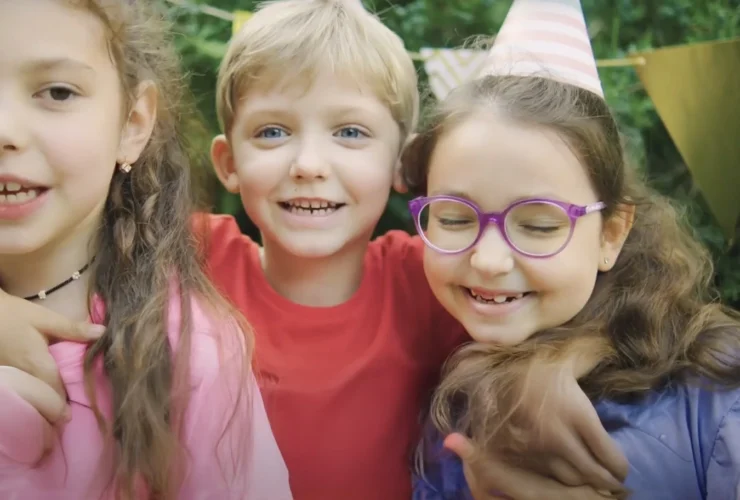A recent study in the Eye Journal examined how childhood nearsightedness (when things close up are seen clearly and those far away look blurry) is linked to a child’s height and weight. The study by Yossy Machluf and others came out in 2024. They looked at over 101,000 young adults who were born between 1971 to 1994. They wanted to see if being short or heavy were things that might make boys or girls more likely to be nearsighted.
What The Study Found Found:
- More girls (26%) were nearsighted than boys (19.1%).
- The ratio of weight to height (known as the Body Mass Index or BMI) and being nearsighted are linked in a variety of ways, which show more clearly in boys.
- Both boys and girls had a similar link between how much they weighed and being nearsighted.
- Shorter boys were more often nearsighted, even when they looked at different weights from average to very heavy.
- Being obese was linked to being nearsighted for boys.
- Boys with slightly high blood pressure were also more likely to be nearsighted.

What This Means:
The research says boys are more at risk for being nearsighted if they are heavier, shorter, or have high blood pressure. Those involved in the study think there should be more research to look into why shorter boys are more often nearsighted. This study helps us understand more about why people get nearsighted and that it’s essential to think about differences between boys and girls when studying it. Since more people are getting nearsighted around the world, it’s essential to know all the potential factors that could make someone more likely to be nearsighted, including gender, height, and weight.
What Should I do as a Parent
- Monitor and Manage BMI: Encourage a healthy diet and regular physical activity for your children to maintain a healthy BMI. This is particularly important for boys, given the study’s findings on the link between BMI and myopia.
- Regular Eye Examinations: Schedule regular eye exams for your children, especially if they are at higher risk (e.g., shorter boys or if there’s a family history of myopia). Early detection can lead to more effective management of myopia.
- Encourage Outdoor Activities: Some research suggests that spending time outdoors can reduce the risk of developing myopia. Encourage your children to play outside and limit screen time.
- Be Vigilant of Vision Changes: Pay attention to any complaints about blurry vision or difficulties seeing distant objects. Early intervention can help manage myopia more effectively.
- Consult Healthcare Professionals: If your child is showing signs of high blood pressure or significant weight issues, consult with a pediatrician or a specialist. Managing these health issues can also be crucial for preventing or managing myopia.
- Educate Your Child: Educate your child on the importance of eye health, encouraging them to participate in activities that are beneficial for their eyes and to communicate any vision problems they may experience. Given the study’s findings, understanding the multifaceted risk factors for myopia can help parents take a proactive approach to managing their children’s eye health, potentially reducing the risk or severity of myopia.
How MVS Vision Helps Children Manage Nearsightedness
As a parent, it’s important to know that simply giving your nearsighted child glasses isn’t the only way to address their vision problems. While glasses do correct their vision, they don’t actually slow down or stop your child’s nearsightedness from getting worse over time.
There are treatment options available that can help manage your child’s myopia and reduce the chances of more serious eye issues as they get older. Some of these treatments include:
Atropine Eye Drops
Atropine eye drops can help effectively slow the progression of nearsightedness in children. These drops dilate the pupils and temporarily paralyze the muscles that focus the eyes. This reduces eye strain and help manage the elongation of the eye that causes myopia. At MVS Vision, we offer low-dose atropine treatments tailored to each child’s needs, ensuring a safe and effective approach to controlling myopia progression. We’ll be with you every step of the way.
Multi-Focus Contact Lenses
Multi-focus contact lenses provide a convenient and effective solution for managing childhood myopia. These lenses offer multiple zones of focus, which can help slow down the progression of nearsightedness by reducing the strain on the eyes. At MVS Vision, our specialists carefully fit children with multi-focus lenses, providing personalized care and ensuring optimal vision correction and comfort.
Overnight Contact Lenses
Overnight contact lenses, also known as orthokeratology or Ortho-K lenses, gently reshape the cornea while your child sleeps. This temporary reshaping corrects nearsightedness, allowing clear vision during the day without the need for glasses or contact lenses. MVS Vision provides expert fitting and monitoring of Ortho-K lenses, offering a non-surgical, effective way to manage myopia and improve your child’s vision and quality of life.
We’re here to help your child!











